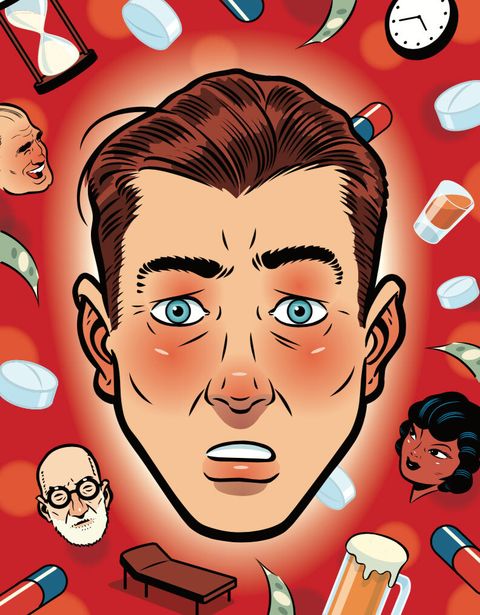People Who Agree to a Psychologist but Continue to Do Bad Things
When it comes to going to therapy to optimize life, work out some issues, being up concerns, or all the other things that therapy can do, guys have reasons for not going. Lots of reasons. Except, well, let us explain why you might want to rethink some of those. Here, your reasons, and insight from real guys and top experts on why they're mostly B.S.
1. There's nothing wrong with me.
Going to therapy isn't about something being wrong with you any more than going to the gym to work on your triceps is about something being wrong with your arms. Therapy is like seeing a trainer, says Amy Morin, L.C.S.W., a psychotherapist and the author of 13 Things Mentally Strong People Don't Do. "Therapists have specialized knowledge and therefore can cut time for improvement." Mike R., for instance, a 27-year-old who first saw a therapist as a college student for his crippling anxiety, says, "Therapy has made a massive difference. There's only so much you can do by writing in a journal and talking to yourself."
2. Okay, fine. Maybe something's kind of broken. But therapy can't fix me.
That's not the point. "Think of your therapist as a consultant, much like you would think about your accountant or attorney," says David Wexler, Ph.D., executive director of the Relationship Training Institute. A therapist helps you understand and manage—not fix.
3. I can't do therapy—I'm the guy who is supposed to have my shit together.
Retired lieutenant colonel Samantha Dutton, Ph.D.,L.C.S.W., gets it. "Many men feel they have to have it all together all the time despite how miserable they feel." But it's hard to do a good job when you're miserable, so if you really need your shit together, you can't afford not to seek help.
4. Going to therapy means I'm weak.
Take it from Morin—or any successful person in the history of ever—when she says that asking for help is a sign of strength. "There's a difference between acting tough and being strong," she says. "It's easy to act tough by pretending that problems don't exist. It takes strength to admit you might need help."
5. They're gonna sit there and judge me. I'm not paying for that.
A therapist is, by definition, disinterested in you. That's not "not interested." It's disinterested. You are, to them, a patient, one of approximately fifteen the average therapist sees in a week. They're not caught up in your life. They're professionals, so they look at you in the same matter-of-fact way your mechanic looks at your car's transmission, not—as your partner might—with the terror and resentment of riding shotgun as you blow through a red light. They care enough to assess the damage, not enough to judge. (This is helpful to keep in mind even if you're in therapy. One survey revealed that 93 percent of people lie to their therapists. Among the prime motivations are shame and fear of judgment.)
6. I have a spouse/partner for that.
Not gonna help. See above. Also, therapists are required by federal law to keep your secrets. Your spouse, not so much.
7. I have CBD for that. + 8 I have vodka for that.
Hmmm…both CBD and alcohol may help temporarily alleviate symptoms of depression and anxiety, according to Gregory Scott Brown, M.D., an integrative psychiatrist and MH advisor based in Austin, "but neither helps address the root causes, and the best chance at sustainable recovery is to get at those." Now, of the two, the jury is still out on the long-term effects of CBD use. "There's simply not enough evidence about CBD and anxiety that we, as medical professionals, can recommend it," says Dr. Brown. "The thing we know about alcohol for sure is that someone who abuses it increases their risk for depression and suicide."
9. I went, but the therapist just sat there and didn't say anything.
Q: Why is it that you just sit there and make vaguely sympathetic noises but don't speak?
A: [Silence.]
Q: No, but seriously.
A: [Silence.]
Q: Oh, I get it. I guess it's because in some types of therapy, your job isn't so much to direct me as it is to allow me to unpeel the layers of my mind. It's as if all these words I'm saying are clearing out the tubes of my mind like an emotional bilge pump until, exhausted, we start getting down to some real issues, issues I've long kept hidden either because they seem so trifling—like when I was eight and fell off my bike and started crying and instead of empathizing with me, my dad sarcastically said, "How many wah-wahs?"—or because they're shameful, like the fact that I think I'm fundamentally unlovable and that if I ever let anyone know me, like really know me, with all my defenses down, they'd see that. Is that it?
A: [Silence.]
Q: [Weeping.]
A: [Hands a box of tissues.]
10. Sitting in a room to delve into your own muck seems like it just gets you covered in muck.
Substitute "physical therapist" for "psychotherapist" and see if this makes sense: Physical therapy can be painful, sure, but it helps you get better. Same thing with your mind. "Sometimes," says Morin, "when you have a cut, you just get a Band-Aid and it's okay. Sometimes it's a deeper wound and you have to go to the doctor. And if you don't address the problem, it's not going to heal. So you might experience pain in the short term, but it makes life much better."
11. I don't want to complain. + 12. I don't want to talk shit about anyone.
"You don't have to complain," says Morin. "You don't have to talk shit about other people." You get to talk how you want to talk.
13. Once you start therapy, you're never done.
Not all therapy has to be long-term. As few as eight weekly sessions can be effective, and for certain fears (like flying, elevators, and the like) and issues (OCD), three hours of intense therapy might be all you need.
14. I don't even know where to start. M.D., PSY.D., PH.D., L.C.S.W.?
"There's massive confusion around what the different mental- health disciplines do," says Dutton. In some ways, the degrees are just a bunch of letters at the end of the person's name. What matters more is your connection with the therapist. But generally, psychologists (Ph.D.'s, Psy.D.'s) and social workers (L.C.S.W.'s) are not medical doctors and cannot prescribe medication, although there are some exceptions. Psychiatrists (M.D.'s), on the other hand, can and do prescribe medication when needed. Being medical doctors, they tend to explore the link between neurochemistry and mental health—e.g., considering a thyroid problem as a cause for depression—whereas psychologists consider behavioral patterns as you work together. It's basically the difference between hardware and software. Don't worry too much about which type of therapist you should try first. "We all talk to each other," says Kate Lowe, L.C.S.W., a licensed psychotherapist in New York City. "Often I'll refer a patient out to a psychiatrist or vice versa."
15. I don't want to take pills.
If you're dead set against the pharmacopoeia, so be it. But if your depression or anxiety is so severe that you're struggling to function, "medication that helps balance neurochemicals like serotonin, dopamine, and norepinephrine can help you get out of a ditch," says Dr. Brown. "Therapy can help you build the tools to stay out." Often, a combination of medication (getting out of the ditch) and therapy (staying out) is the most effective.
16. I tried, but finding a therapist is impossible.
Difficulty finding a therapist is one of the most common barriers to therapy— especially since 115 million Americans live in an area with less than one mental-health professional for every 30,000 people. Try asking your doctor for a recommendation, or start with who's on your insurance plan and set up some conversations. It's less like finding your go-to bagel store than it is discovering your favorite coffee shop. In the former, proximity and an adequate everything bagel are really the only things that matter. The latter takes trial and error, time, and a battery of pointed questions. (See #17, below.) You deserve someone with whom you can be radically honest, says MH advisor Drew Ramsey, M.D., a psychiatrist in New York City. "I always encourage people to have consultations with two or three different therapists." Don't worry if it's not a good fit and you move on after the first few sessions. "We're professionals," says Dr. Ramsey. "We can handle it."
17. I wouldn't even know what to say to a therapist.
Sure you would. They're a person just like you, and you can start with these 7 questions:
- I'm dealing with x—what is your experience treating this type of issue?
- What kind of treatment or therapy do you think might benefit me most?
- Can you describe how that treatment works?
- How do you assess progress?
- How long do you anticipate we'll work together?
- What is your availability?
- How much is this gonna cost me?
18. I'm broke and I can't afford therapy.
If you choose to go to someone outside your insurance network, therapy can be expensive. And quite a few therapists don't accept insurance at all. Many plans offer some out-of-network coverage, but this means you'll have to carry the cost until you are partially reimbursed. If much of your anxiety stems from financial stress, this can range from untenable to unbearable. Happily, since the early 2010s, telemental health, or telemedicine—or, I wish, therappy—has blossomed. Research has shown that telemental health services, which typically rely on a network of far-flung therapists who respond to patients via phone, text, video, and chat messaging, are an effective and less costly alternative to traditional therapy. Where to get therappy:
Talkspace
The Talkspace app uses a network of vetted therapists who have at least 3,000 hours of clinical experience. You send text, audio, or video messages and your therapist will usually respond within the same day.
COST: From $65 to $99 a week.
GOOD FOR: Anxiety, depression, PTSD, relationship counseling, eating disorders.
7 Cups of Tea
7 Cups of Tea is a peer-to-peer network of volunteer "listeners," trained in active listening, who are available through online chat. Licensed therapists are also available for an additional monthly fee.
COST: Free.
GOOD FOR: Those who want to connect with others with similar problems, and/or are broke.
BetterHelp
The more than 5,000 licensed therapists in Betterhelp's system are each required to have a minimum of three years and 2,000 hours of hands-on experience. BetterHelp offers live phone-chat sessions.
COST: From $40 to $70 a week.
GOOD FOR: Stress, anxiety, depression, addiction, anger, sleep problems, grief and more.
Woebot
What happens when cute start-up culture, AI, and mental health commingle? Woebot, an AI-based chatbot created by a team of Stanford psychologists and AI experts.
COST: Free.
GOOD FOR: Those who do not mind accepting life advice from a robot.
This content is imported from poll. You may be able to find the same content in another format, or you may be able to find more information, at their web site.
19. What if my employer finds out?
They won't. That's because there are a series of firewalls, called HIPAA, which is short for the Health Insurance Portability and Accountability Act. HIPAA is a federal law that forbids your insurance company (and your mental-health- care provider) to disclose any information about you to third parties without your explicit consent. (This includes the diagnosis your therapist assigns you for purposes of reimbursement.) So in short, your employer will not find out about you seeing a therapist unless you choose to alert them.
20. What if my friends find out?
Yeah, what if your friends find out? If they're good friends, they'll be supportive. If they're assholes about it, get new friends.
21. What if my spouse finds out and thinks it's about them?
"Most of the time, men come in because their spouse is making them do it," says Morin. "If the spouse finds out and the men haven't told them, what I've mostly seen is that they're proud. It makes you a better husband."
22, 23. Therapy is a rich-person thing OR a white-person thing.
"Psychotherapy may have been developed by Sigmund Freud for wealthy white women," says Monnica T. Williams, Ph.D., but it doesn't have to stay that way. It's true there are hurdles: Research has shown that people prefer therapists of their own race or ethnicity, and the shortage of mental-health professionals of color is acute, she notes. "Yet there are a lot more social workers [L.C.S.W.'s] of color than psychologists and psychiatrists." So you might find a bigger pool to choose from by looking for someone with an L.C.S.W.
24. Therapy is a young-person thing.
Nah. They just talk about it more. Millennials may be more likely to talk about mental illness and treatment openly than older generations, but it's more common for those in the 50-and-older demographic to receive treatment for mental-health issues.
25. I don't have time to go sit somewhere and talk about my problems.
When you consider that every week, the average American spends:
- 4 hours 47 minutes on Facebook
- 3 hours 2 minutes on Instagram
- 3 hours, 2 minutes on Snapchat
Then 50 minutes of therapy a week doesn't sound so daunting.
26. I went once. It didn't take.
See # 16. In other words, you might have to look a little more.
27. I wanted to sleep with my therapist, it got weird, and I quit.
Oh, hey. This is Joshua. Yeah, this happened with me. Think about it: You're in a small room with someone. Your secrets are coming out like you're in an emotional colander and still they accept you. In fact, they're sympathetic. Of course intimacy is going to flower, and it makes sense why you might misidentify it as romantic. Sometimes you have to pick someone you're not attracted to. Sometimes you write about it in a story for Men's Health, then send the clipping to your therapist and see how it all shakes out.
28. The only thing worse than going to therapy is hanging out in the therapist's waiting room.
If you're not doing therapy online or via an app, and you're visiting a real-life therapy office, seeing the faces of your fellow patients as they scurry to and from the office is pretty awful, especially for couples counseling. But instead of seeing the suffering of you and your fellow human beings as shameful, you might take that moment to feel comforted that not only are you not alone in needing help but you're not alone in getting it.
29. I have so many other day-to-day hassles in my life that need my immediate attention; therapy doesn't make the cut.
Maybe not right now. But as Dr. Ramsey says: "I would argue the most expensive thing is not to get treatment. A good psychotherapist will make you a more successful, grounded, and wealthy individual, however you define wealth."
30. F* it. I'll just say it. I'm scared.
Yeah, that. Big one, but not impossible to overcome. Find out how I faced all that here.
Joshua David Dtein has written for publications including _The New York Times, Fatherly, Esquire, and The Guardian.
Source: https://www.menshealth.com/health/a27496158/excuses-guys-make-not-going-to-therapy/



0 Response to "People Who Agree to a Psychologist but Continue to Do Bad Things"
Post a Comment